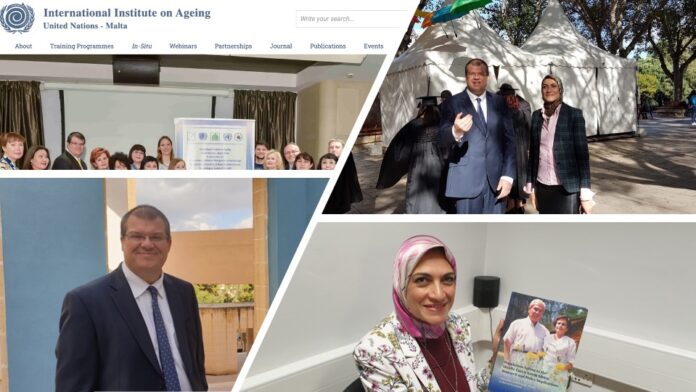As part of MENARAH’s engagement activities to raise awareness of healthy ageing in the Middle East and North Africa, Professor Hussein visited the United Nations’ International Institute on Ageing to discuss the topic with its Director, Professor Marvin Formosa.
The visit included several meetings with colleagues at the Institute, a seminar at the University of Malta and site visits to long-term care facilities. In a conversation with Professor Formosa, we discussed the meaning of healthy ageing and how we can promote healthy ageing behaviour. We also discussed the impact of COVID-19 on older people and their wellbeing.
Professor Formosa highlights the complexity of healthy ageing, where both subjective and objective aspects exist. He emphasised that we should not employ a purely medical perspective when examining healthy ageing as age-related diseases could be an inevitable part of the life course. Hence the meaning of healthy ageing should go beyond living with a complete absence of disease. He explains that living in a dignified way that fulfils an individual’s desires and aspirations can be regarded as healthy ageing, even in the presence of health conditions. Professor Formosa speaks eloquently about healthy ageing and how it may mean different things to various individuals and groups. Therefore, it is crucial to empower older people and ensure they have a voice when services and interventions are designed for them.
Professor Formosa also discusses the differences between the advice some people may receive to maintain their health and the realities they live in. For example, many people appreciate the value of regular physical exercise and having hobbies. However, many people may be unable to afford these due to long working hours or poverty. Furthermore, the environment they live in might not enable them to do so. He highlights that when considering interventions to promote healthy ageing, policymakers need to consider the individual within their context, families, and environment. Hence, policies should address the broader issues surrounding the individual and appreciate the limitations in implementing some interventions due to a lack of an infrastructure that facilitates the uptake of such interventions. Understanding the culture of ageing and the role of families and local communities and tailoring services and interventions will likely improve outcomes for older people and the wider society.
Professor Formosa highlighted the adverse impact of COVID-19 on older people and their families, especially in terms of increased levels of social isolation and adverse impact on their physical health. He concluded by calling for working in partnership across different ministries and in partnership with national and international organisations. More importantly, he emphasised, is ensuring a meaningful inclusion of older people’s voice and wishes.
MENARAH is looking forward to continued partnership and collaborative opportunities with the United Nations International Institute on Ageign and the University of Malta with the ultimate goal of enhancing the lives of older people across the MENA region.




